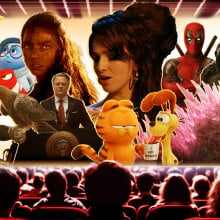Every second counts.
That mantra appears more than once in Season 2 of The Bear. At first, the words feel like a straitjacket.
After all, mistakes in a fast-paced kitchen can spell doom. Tickets pile up, dishes go cold, tempers rage. In that context, "every second counts" sets an unforgiving expectation.
When the bombastic Richie (Ebon Moss-Bachrach) spots the saying on the wall of the fine dining restaurant where he's meant to stage for the week, his resentment toward the temporary assignment — and the mantra — is palpable.
But the episode "Forks" is a revelation for Richie and viewers. Somehow, by the end, Richie's anger and self-doubt are transformed by the simple, but not easy, act of being present in every moment. As Richie ultimately learns, thanks to a brilliant cameo by Olivia Colman, every second counts not because it demands perfection, but because it is a chance to be fully alive.
In those moments of intentional, nonjudgmental awareness, where we're not clinging to or pushing away thoughts and feelings, we come to know our humanity more deeply.
That sense of awareness is mindfulness at its most basic. While that word is never spoken in the show, the theme sneaks into The Bear's second season again and again.
Pausing amid chaos to heal
It's a surprising evolution of the first season, which grappled with loss and grief. Chef Carmen "Carmy" Berzatto (Jeremy Allen White) is trying to find his way forward after losing his brother, Michael, to suicide and inheriting the restaurant, the Original Beef of Chicagoland, that Michael lovingly but haphazardly ran.
The Bear's initial take on the ways people adapt to disorder and trauma suggested that chosen family can deliver people from darkness, however imperfectly. Save Carmy's participation in Al-Anon meetings, the show's characters don't pursue any formal kind of healing, like therapy. Instead, characters follow the arc of their emotions, no matter how wildly they swing between extremes. Cousin, uncle, sister, chef, Fak (Matty Matheson) — they can be counted on to help collect pieces of the wreckage when things fall apart.
But that's simply not enough in this season of The Bear, which makes the case that the awareness gained by pausing to register one's emotions is the first step toward healing dysfunction. That pause can also disarm the stories people tell themselves about who they are, for better or worse.

First there are deliberate, meaningful pauses that allow a character to revel in their joy. Line cook Tina (Liza Colón-Zayas) does exactly that upon learning that she's becoming sous chef. Her face registers the emotional triumph; for so long she's felt invisible, but she always believed in her own worth, and now Carmy and chef Sydney (Ayo Edebiri) do, too.
When Richie finally understands his own purpose, after a difficult week of staging, he gleefully barrels down a Chicago street with his daughter's favorite Taylor Swift song blasting in the car. Uncharacteristically, he's enlivened, not burdened, by what he feels. The story Richie is accustomed to telling about himself — that he's a screw-up who's "ancillary" — holds far less power now.
But pauses also come in the heat of an argument. More than once, Carmy hesitates as his frustration mounts. Prone to letting his relentless fear of failure overshadow his tenderness, Carmy apologizes by using a sign language gesture of rubbing his fist over his heart to say sorry. It's worth noting that his apologies are directed toward Sydney, a Black woman. Rare is the television show that depicts a white man unequivocally acknowledging his error to a Black woman, treating her as an equal.
Tweet may have been deleted
Still, it's not all flashes of growth and maturity. The characters continue to find themselves in hellish moments of chaos that punctuated Season 1.
In these scenes, people harm each other when they're overcome by emotion and can't pause before negative feelings become regrettable actions. The Christmas episode "Fishes," starring Jamie Lee Curtis as Carmy's volatile mother, Donna, is an hourlong depiction of the suffering people endure when mindfulness is out of their reach. The chaos that envelops the Berzatto family is a reminder that no matter how hard each character strives to adapt to the dysfunction, even thriving in it at times, there's no escaping its suffocating grip.
In many ways, this is where viewers find Carmy at the season's end: stuck. He's not at home, coping with his mother's excessive drinking, but trapped in the walk-in fridge of a transformed Original Beef on its first night of serving diners a "thoughtful" chaos menu.
Carmy can't help but lay into himself for neglecting to get the walk-in fridge door fixed. Now he's forced to await a rescue while his team plows ahead without him. He blames the distraction of being in a new relationship.
"No amount of good is worth how terrible this feels," he laments, not realizing that his girlfriend, Claire, (Molly Gordon) is listening.
Then an exchange with Richie, who questions Carmy about why Claire fled the kitchen in tears, erupts into an impulsive, devastating fight that could threaten their lifelong friendship.
There is no one to take stock of the wreckage but a distraught Carmy. The ending raises the question of what he can do in Season 3 to repair any of the harm he's caused.
The skill of equanimity
It's hard to imagine Carmy taking up a formal mindfulness or meditation practice, but if he were to do so, one place to start would be a track called "Welcome to the Party" by the meditation teacher Jeff Warren.
Warren prefers to think of mindfulness as one way to talk about a larger human "capacity for living for more awareness." This ability, he notes, doesn't belong to any single tradition or philosophy.
His guided meditation puts a unique spin on the traditional approach to what's known as equanimity. In Buddhism, equanimity is the skill of non-interference, which Warren describes as a natural human capacity that helps us remain poised when beset with uncomfortable emotions. This can mean not pushing away feelings like anger, fear, disappointment, or self-loathing. (One can also exercise equanimity by not clinging to positive feelings, like joy, pleasure, and love.)
In "Welcome to the Party," Warren instructs listeners to play the "affable" host, greeting each emotion with an accepting attitude. This is far harder than it might seem, because people are typically conditioned to fight, block, or suppress discomfort.
Imagine Carmy in the walk-in. Alone, with only his terrifying thoughts and feelings, he fights what he's experiencing by making binary declarations about his character, free of any self-compassion. He reacts to what's happening, rather than taking the time to pause and respond.
"When people say let go, welcome, it means can I put down my defenses and just let myself feel what I'm feeling here," says Warren, who plans to watch but hasn't seen The Bear yet. "It's very brave, and most of us don't know how to do that. It takes practice."
Many of the characters in Season 2 do just that — let themselves feel without lashing out.
Tweet may have been deleted
When a person needs chaos to make them feel alive, as characters in The Bear do, Warren says they often can't experience contentment when things are calm or settled. Still, there is a bittersweetness to watching the show's characters make incremental peace with surrendering the part of their identities that became so adept at navigating chaos.
What they learn instead is that intentional pauses that lead to heightened awareness can create a refuge — and an opportunity to deeply feel what's happening in their lives. It seems contradictory, especially because mindfulness and meditation are caricatured as practices for becoming emotionally neutral.
But this is far from the case, says Warren. When emotions aren't being buried or left to fester, the only option is to fully feel them.
"It'll be more raw and real than anything you can imagine," Warren says, noting that cultivating equanimity means you're less at the mercy of intense emotions. "Feel more, suffer less, is how I describe it, and how a lot of people describe it."
As for Carmy's mistakes, a mindfulness practice wouldn't prescribe shame or judgment as a corrective measure. Instead, it would prompt self-compassion and forgiveness, without obsessing over failure that only steals precious time away from making things right.
"It'll be more raw and real than anything you can imagine."
"Inevitably, you will do that," says Warren of inflicting pain on one's self or someone else. When that happens, he notes that the skills of mindfulness can still help people recover faster, apologize, and repair the harm.
If viewers are lucky, Season 3 will let them witness Carmy make that journey.
There's no indication that The Bear creator Christopher Storer intended to make mindfulness a central theme of the second season. He doesn't seem to have commented publicly on having his own mindfulness or meditation practice. But he and the show's writers have done something impressive, and invaluable, by showing the good that pauses and awareness can bring, and what risks being destroyed when emotions rule us.
On a show like The Bear, which seems determined to authentically reflect the gifts and trials of being human, every second does indeed count.
For more mindfulness stories in your inbox, sign up for Mashable's Top Stories newsletter today.
Topics Mental Health Social Good























